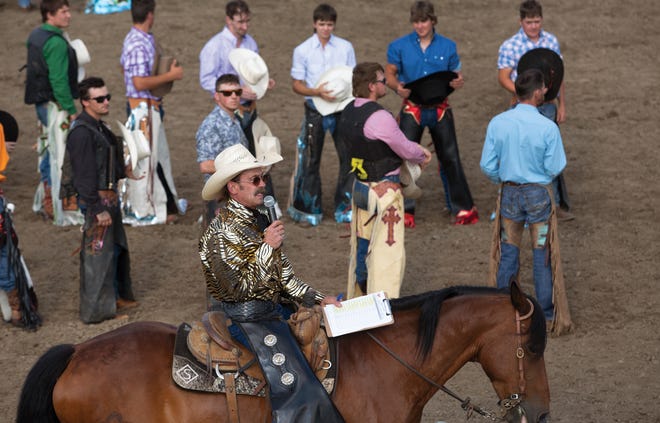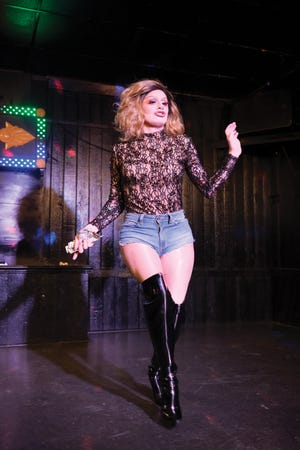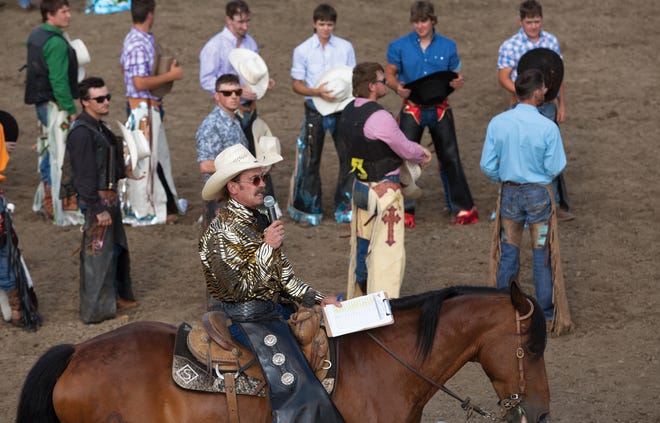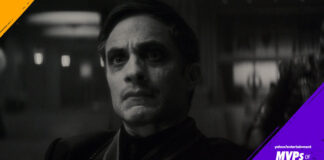
On most Saturday nights, Russ Spreckelmeier can be found atop a horse at the center of the arena at the Fox Hollow Rodeo in Waynesville, Ohio, where he works as the announcer. Aside from the cordless mic in his hand, his outfit is hat-to-boots haute honky-tonk, with a stylish Western shirt tucked into his Wranglers “cowboy cut” jeans, finished off with a saucer-sized belt buckle and a black kerchief knotted jauntily around his neck.
About 75 miles away in one of Columbus’ gay bars, many Saturday nights will find a younger Spreckelmeier engaged in a more complex preparation. With his genitalia carefully tucked and hidden under “lots and lots of duct tape,” Spreckelmeier’s only son, Wyatt, slips into breast forms, a shimmering bodysuit, high-heeled sandals and a long wig. A 23-year-old drag queen who recently stepped down from a two-year reign as Miss Southbend Tavern Newcomer, Wyatt says his drag persona does not emerge until he applies his long false eyelashes.

As the lights go up on the rodeo arena and dive bar dance floor, both Spreckelmeiers begin their performances. Russ, a former bucking horse rodeo champion, U.S. Marine and fervent supporter of former President Donald Trump, launches the evening with a prayer, a circle of rodeo cowboys kneeling in the dirt around him. Wyatt, a gay former hair stylist who now works in a Columbus bank, becomes Kari O’Knife, dancing gymnastically across Southbend’s small stage while lip-synching to Shania Twain’s “Man! I Feel Like a Woman.”
You might be excused for assuming, in these days of divisive culture wars and convenient stereotypes amplified by social media, that this father-son relationship fractured long ago, but you’d be wrong. Both men acknowledge past struggles, but the two share more than DNA and a last name. They share a zeal for flamboyant entertaining, for being the center of attention. And even though both bear the scars of bad decisions and stubbornness, they share a mutual admiration for one another and the work they do in the spotlight.
Wyatt—yes, named for Mr. Earp, Russ’ favorite gunslinger—says his father “has issues, maybe lacks judgment, but there’s never been a moment when he did not support me, unconditionally, which not a lot of people can say, especially when you’re gay and come from a small town in Ohio.”
“He can be a stubborn little shit, but if you want to say anything bad about my son, you’re going to have to fight me,” Russ says from his Diamond S Horse Co. ranch in Springboro, Ohio. “I’m proud of him.”

If you’ve been floating in the quiet backwater of cultural currents, you may not know that drag has become close-to-mainstream entertainment in America and hugely popular in Columbus. The shows still draw some outrage from social conservatives (Columbus schools canceled a “drag queen story hour” event last year after school employees suffered social media harassment), but the popularity of RuPaul’s Drag Race has knocked down most barriers that once kept drag confined to late night shows in gay bars. Nina West, queen of Columbus’ queens and a former Drag Race contestant, sold out four consecutive nights at the Columbus Zoo in July. Corporate America has joined the fun, with Cardinal Health sponsoring a “Drinks and Drag” fundraiser earlier this summer for Opera Columbus.
Drag shows at the most popular venues regularly feature Drag Race talent and sell out their seats. But for every star-studded event at Axis or District West, there are aspiring queens refining their looks and sharpening their moves in smaller venues: Boscoe’s, Cavan Irish Pub or Southbend Tavern, a charmingly dive-y Merion Village gay bar where Wyatt Spreckelmeier answered questions while applying his makeup in a cramped dressing room with two other drag queens.
It was a warm May evening, and Kari O’Knife’s last performance before a pageant the next evening, when she would pass along her tiara to the next Miss Southbend Tavern Newcomer. (While in drag, Kari prefers she/her pronouns.)
Originally from Gratis, a tiny village in Preble County just east of the Ohio-Indiana border, Wyatt is the only son of Lisa and Russ Spreckelmeier. His parents divorced when he was 8, but “I spent a lot of time with my dad when I was growing up. My earliest memories are riding in the car with him and singing,” he recalls. “We’d sing everything—Madonna, Cher, George [Strait]. My dad loves to sing.”

Wyatt was still in preschool when his father suffered his worst rodeo “wreck.” Bull riding at the Butler County Fair in Southwest Ohio, Russ tangled in his rigging during the dismount and the bull stepped on his face. He was airlifted to a Cincinnati hospital, where his face—including both his eye sockets—was rebuilt, leaving one eyebrow slightly cocked and branding him with a perpetual look of high skepticism.
“I only remember it because it was so bad,” Wyatt says. “Everybody thought he was dead.” Despite the emotional trauma, Wyatt learned rodeo at an early age and competed in a number of events, including bull riding and speed events on horses. “I’ve never seen such natural ability in my life,” his proud father says.
Wyatt’s teen years, though, were difficult. He came out at 14, and not everyone was as supportive as his father. Wyatt also had problems with alcohol and cocaine—substance abuse is another tendency shared with Russ. Though he spent some time homeless, sleeping on friends’ sofas, Wyatt completed career school in rural Preble County, where he studied cosmetology.
He found work in a salon in Dayton, where he met Jackie O, the drag persona of his salon manager, Jacob Sams. The veteran performer became his “drag mom.”
“When I watched her on stage the first time, it was literally like there was no one else in the room. Everyone was mesmerized,” Wyatt recalls. “The next week, I was doing her nails, and I said ‘I saw your show. I have to do that.’”

The Fox Hollow Rodeo hosts events every Saturday night, one of the few rodeos in the region operating year-round, but the fan turnout grows when the show moves outdoors. This spring, wet weather pushed that move to mid-May when the rains let up long enough to groom the dirt floor of the arena. On this night, about 1,100 fans gather to cheer on the bull riders as they fight to stay on their mounts for the 8 seconds required to post a score.
The arena is enclosed by a pipe rail fence about 7 feet high, with four wooden enclosures at one end known as “bucking chutes.” As the crowd finds their seats in the bleachers, Russ sits atop his newest horse, a big bay named Yoda. A mix of quarter horse and draft, Yoda—like his 58-year-old owner—has retired from rodeo’s bucking horse competition. Saddle bronc riding was Russ’ competition event. He won his last championship title in 2017 from the National Professional Armed Forces Rodeo Association.
His first win came at age 11, riding a steer. “Man, I knew it then. I knew this is what I’m gonna do. In all honesty, it felt like a natural talent.” At 5 feet, 5 inches and 155 pounds, Spreckelmeier says, “I wasn’t made for football. Couldn’t play basketball. But the chicks all liked it ’cause I rodeoed. Wore Wranglers and boots to school every day.”
Tonight, he’s wearing Wranglers with a 36-inch inseam, far too long for his frame. They need the extra length, he explains, so they properly stack over his spurred cowboy boots when he sits his horse. It’s not quite Memorial Day, but he and most of the riders have switched to their white straw cowboy hats. Spreckelmeier’s ensemble is completed with a silver belt, big buckle and a red satin shirt that shimmers in the evening sun.
He quietly puts the horse through a few moves, side passing along the fence, stopping to let children pet Yoda’s neck. But when it’s showtime, Spreckelmeier launches into his role as announcer, emcee and entertainer. He rustles up the children for the pre-show, sheep-riding competition, explains the rules of bull riding for novice spectators and gets the crowd’s blood flowing with patriotic fervor.

“I got a serious question,” his voice booms through the loudspeakers. “How many proud Americans do we have in the stands?” Lots of cheering. “You notice we’re not afraid here to show our love for the flag. No one took a knee during the anthem.” More cheering.
“We have some of the best bulls in the country, born right here on American soil. Right here in the USA. You take a cowboy and you put him on their backs and you’ve got the greatest show on dirt, right here.
“How many of you are ready to rowwww-dee-OH?” Wild cheering.
He chatters over the loudspeakers throughout the show with David Markham, the co-owner of Fox Hollow, who sits above the bucking chutes and controls the lights and music. Together, they fill any dead air while the next rider settles onto his bull in the chute.
“Pistol Pete is as honest as a bull can be, Russ,” Markham calls out. Russ responds: “I think there might be a liddlebidda money on this ride, David.”
Rod Frisby, the co-owner who founded Fox Hollow in 1989, says Spreckelmeier’s energy is central to the atmosphere of the rodeo, and “his strongest attribute is his patriotic connection. Him being an ex-Marine, and he loves his country. He just does such a good job.”
This is a crowd that finds nothing toxic in masculinity and an event where they stand for the flag and kneel for prayer. Pro-gun-rights T-shirts in the audience are outnumbered only by gingham Western wear. After priming the crowd with God and country, though, Spreckelmeier shifts to the familiar antics that are popular in every kind of arena in the country. He calls for a T-shirt toss, leads the crowd in singalongs of “Don’t Stop Believin’” and “Sweet Caroline” (complete with cellphone flashlights). He climbs into the stands and teases young women into singing into his mic.
Russ jokes that “I’m an attention whore” but insists it’s all part of his job. “I’m not just a rodeo announcer; I’m [expletive] P.T. Barnum,” he says later, using one of the many F-words he drops into every conversation.
A more apt comparison might be William “Buffalo Bill” Cody, who took the county fair riding and roping contests popular on the frontier, added theatrical flourish and turned them into the Wild West show. Cody’s program included demonstrations of “cowboy fun,” which eventually evolved into modern rodeo, a sport that attracts more than 43 million fans, according to the Professional Rodeo Cowboys Association. As it expanded from county fairs to big-city arenas, though, the focus shifted from vocational skills of the cowboy trade—riding, roping and otherwise wrangling large livestock—to the X-Game of rodeo: bull riding. Almost entirely dominated by men, bull riding is fast, exciting and dangerous. And it’s growing in popularity. The Southern Extreme Bull Riding Association, based in North Carolina, sanctions more than 450 events across the U.S. each year, including Fox Hollow.
During the mid-May night at Fox Hollow, bull riders come primarily from Eastern states and bear names like Josh, Cody, Brandon and Tyler. They walk with a definite swagger, tip their hats to applause, brush off their injuries with jokes and dress in cowboy clothes that often include faux fringed chaps.
And here, in the theater of gender expectations, is where Russ and Wyatt perhaps perform in tandem, their individual spotlights all but converging on stage. While drag is a cabaret of exaggerated femininity, rodeo bull riding is a staged fable of overstated masculinity, caught up in the ideals of American cowboy culture—a short-lived chapter in American history that never happened at all in Waynesville, Ohio.

Back at Southbend, Kari O’Knife is ready for the show. She has a frame like her father’s—slight and maybe 5 feet, 10 inches, including her 4-inch heels. She has large doe eyes even before applying the heavy eye makeup. She takes to the stage in a blue jumpsuit with a black bra peeking through the sheer lace at the top.
She opens by lip-synching to “Kerosene,” a break-up ballad by country music star Miranda Lambert. She mugs for the crowd, her mouth stretching to silently exaggerate the lyrics. She skips across the stage, collects dollar bills from admirers and now and then drops to the floor in splits.
Kari’s rural roots are an important part of her act. Country songs, though not a typical drag queen choice, are standard in her repertoire. She has chosen the theme for the next night’s pageant, where she will hand over her crown: Rhinestone Cowgirls. “I’m still a redneck at heart.” One of her favorite events of this year has been performing as one of several queens in a “Hoedown” at Axis. She describes the audience as “a bunch of drunk white girls who love country music, and I was like, ‘I’m feeling this!’ I danced as hard as I could.”
Generally, though, Kari feels most comfortable at Southbend, a low-key venue that draws a small but enthusiastic crowd and where the drinks are cheap and potent. The bar has nurtured a number of aspiring drag queens, says Milaye Duplaix, a queen who shares the stage with Kari that night. “Pretty much all the drag entertainers of the past five to seven years have started here or at Boscoe’s,” she says. “It’s the kind of place where you can get a start and hone your craft.”
Kari says drag should be all about having fun, but she acknowledges it’s been more than that to her. “I’m the opposite of my dad. I suffer from anxiety, and I can’t talk to people. But when I’m in drag, I can get up on stage and be a star. Everybody likes me. Everybody thinks I’m great.”
Jackie O, Kari’s “drag mom,” agrees. “I think it has helped her build a lot of confidence,” says Sams, who drove over from Dayton to see the show. “It’s something you take with you. You realize, ‘If I can be this confident on stages, maybe I can be more confident every day.’”
When Russ first saw Kari perform, he pulled her aside after the show and said, “In this life, everyone searches for what they need to do. And it looks like you found exactly what you need to do.”
Russ has been to several of Kari’s shows, usually dressed in his best cowboy garb, sometimes coming straight to a show from the rodeo, says Katie Deaton, a young barrel racer, close friend of both men and Russ’ former girlfriend. “Every time Wyatt performed locally, we’d be there,” she says. “He loves Wyatt.”
The two men have a lot in common, Deaton says. “If you’d seen Russ’ closet, you’d think he was trying to be the male version of Wyatt,” she says. “He loves the sparkly outfits, and he loves being the center of attention and having the eyes on him.”
Yet there are many differences, too, enough to cause a recent father-son rift.
When I began work on this story, both Spreckelmeiers expressed enthusiasm and agreed, in general terms, to meet for a photo shoot. Those plans fell apart, however, as the stresses of 2020 left their relationship frayed by the spring of 2021. Wyatt recalls driving his car through a ditch to run down one of the multiple “Trump 2020” signs in his father’s front yard. In an interview, Russ objected to his son’s judgment. “I don’t tell anyone how to vote, and no one should tell me how to vote. It’s my business.”
“It really hurts,” Deaton says. “We all would have so much fun and be so supportive of one another. And now, because of this ordeal, we can’t, and it’s upsetting. I hope they can work it out. I hope Wyatt can be forgiving, and Russ can shake down his ego. He’s got a big ego.”

It would be easy to invoke the tired red-blue trope and suggest that the wedge in their relationship is a metaphor for the nation’s struggle. But that would be silly. Quarrels between proud fathers and headstrong sons are among humanity’s oldest stories. It’s perhaps more likely that two men who have always loved the spotlight are not entirely comfortable sharing it.
Whatever lies ahead for the Spreckelmeiers, father and son, we can assume it will be lively. Kari has handed off her “newcomer” crown but is eager for new opportunities in her fifth year of drag performance. Russ is raising a Brahma bull from calf to ride in the arena as an alternative to his horse (an homage to Alex Karras’ mount in “Blazing Saddles”).
It’s fun to imagine the potential collaborations. Wyatt recalls that his father once suggested he enter the All American Quarter Horse Congress, Columbus’ premier equine event, and compete in drag. While Kari has sailed through the Short North in full regalia on a Lime scooter, Wyatt isn’t sure he’s ready to ride horses in costume.
But don’t rule it out. After all, the International Gay Rodeo Association has been organizing rodeos in western states since 1985, and some events involve drag performers. And in 2020, gay country musician Orville Peck brought rodeo cowboys and drag queens together in a music video for his 2019 release, “Queen of the Rodeo.”
If the time comes to bring drag to Ohio rodeo, these two might just be able to pull it off.
This story is from the August 2021 issue of Columbus Monthly.








